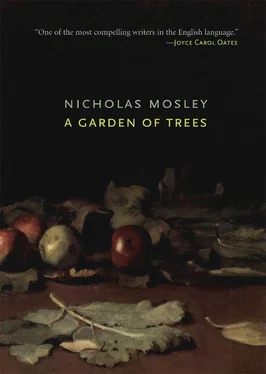In solitude one does not exist because one is not human. And so there is no real solitude, only the fear of it. If the fear becomes answerable by the usual means then one goes mad. But that, too, in its way, is an answer. Madness occurs when the normal means fail.
Of the normal means hypocrisy is the easiest even for those who have imagination because it is possible to recognize hypocrisy and loathe hypocrisy and yet still be a hypocrite. In fact for the majority of people who have imagination this is the usual condition because love and faith are difficult to come by. They know that they are hypocrites and yet they have no means of ceasing to be hypocrites. To exist in solitude is impossible and to go mad is undesirable. So in spite of themselves they are hypocrites and knowing it they are never quite at peace. For imagination contains the expectation of truth.
This is the human predicament. And a person who has imagination will find, if he remains in the predicament for long, that he loses his imagination. That is why older people will usually admit the predicament less readily than the young. For the mind which both condemns the notion of hypocrisy, and yet is aware of the unalterable existence of it in itself, is an uneasy mind; and if hypocrisy is thus recognized it will ultimately be defeated in its purpose. For the purpose of hypocrisy is the maintenance of belief — a peaceful belief even at the cost of truth. So that after a time the hypocrisy is no longer recognized, and the apparatus of the mind which once did recognize it becomes withered and dead. The imaginative awareness of solitude becomes, in time, like the acceptance of solitude, impossible: and the imagination dies.
But to those who are in the predicament and are fighting it and who cling to their imagination with an inherent desire almost as strong as that with which they cling to their belief in existence, there are the remedies of faith and love. But these remedies cannot be approached either intellectually or through an effort of will. If they are, then it is likely that the attempt will result in hypocrisy. One of the cruelest qualities of the predicament is the impossibility of intellectually discriminating between hypocrisy on the one hand and religion and love on the other. What is called religion is often a facet of hypocrisy, and so is what is called love. The intellect has no power to say, “This is or that is not hypocrisy,” because the intellect is concerned only with rationalisations after an assumption and not with the assumption itself. The intellect cannot stand outside itself and judge itself because it has nowhere to stand. But there is something that stands outside the assumption, and that is emotion.
Emotion is that which makes belief a reality. For, when the question is put, “Why should not emotion be a facet of hypocrisy?”, the question has lost its force. It has somehow become meaningless. It is not even frightening. Emotion is that which hypocrisy is not.
That is because emotion comes from outside a person and is not in its origins part of them. It is the only reality that is unchallengeable because it is objective. A person cannot make himself love and he cannot make himself hate, and he cannot give to himself the conviction that is religion. That is why an effort of will in this direction will often lead to hypocrisy. But although it is emotion that makes conviction possible, that stands outside the assumption and gives validity to it, it is for this very reason the most difficult thing to come by, because it is unpredictable and uncontrollable. The fact that it is in its origins outside a person is at once its triumph and its misery.
A man cannot make himself love. A man cannot give himself faith. He can only wait till the chance of love comes, and when it comes be ready to receive it. If it does come, he at least has the chance of it. If it does not, then he will have lost his battle. This is why hypocrisy can be called merely an unlucky position, and love a lucky one. Love and faith are really the same thing.
It is possible that love will come to everyone who is ready to receive it, but that, again, is an intellectual conjecture, and cannot finally be judged. It is impossible to know why love does or does not come.
It is thus that the problem of solitude stands at the centre of man’s existence. It is the problem of life or death, and love is the only answer for those who would keep their imagination. Love is the only remedy to solitude, love is the only means to keep alive. For without love a man loses his imagination; without imagination a man soon ceases to be human: without humanity a man does not exist.
When I left Annabelle and Marius and Peter in the square I realized the force of this only dimly. All I knew was that I was feeling something that I had never felt before in my life and which in fact had seemed to turn me into a different person. I did not think about love and did not question it: I knew neither what it meant nor what it entailed nor even that it would last. But the feeling was that for the first time in years I was not faced with the problem of solitude. Before this I had fought with the problem and had found myself being beaten by it: I had even learnt, in some frightening way, the meaning of that phrase, “the descent into non-existence.” But now it was the problem that had ceased to exist. And I, perhaps, had begun to exist. It was the force of this that had made me leave them so suddenly. When one becomes a different person at the age of twenty-three it is a shock that has to be suffered apart from the cause of it.
5
Alice rang me up the next morning. I had slept late, and was still in bed, and I went out sleepily onto the landing. Alice sounded cheerful. I could not concentrate upon what she was saying, but I agreed to have lunch with her. Then I went back to bed.
By the time I arrived at the restaurant I had remembered that my last meeting with her had not been successful. Marius and I had been rude, and she had left us angrily. I now wished to make up for this, and for more besides; because it struck me suddenly that in all my friendship with Alice there had been something degrading for both of us. I had liked being with her because as a character she fascinated me, and by watching her I thought I was learning about people as a whole. I liked listening to her oddities and contradictions — expressions of a character that seemed to exist so much on the surface, flashing out in different directions like the facets of a diamond, indicating a centre hidden and obscure. She seemed to behave with the unswerving superficiality of an older generation; and yet, being really of my generation, to be possessed by none of the older people’s righteousness and cant. Thus I could both approach her and at the same time try to find out what this life on the surface meant — why it was necessary for so many energetic people to spend their energy like this — whether they recognized their oddities and contradictions and practised them purposely, or whether it was merely some instinct within them which made them function as they did. But in approaching her like this, as an object of experiment almost — to be observed and analysed as an excellent example of what I wanted to understand — I was treating her as a machine and not as a person, and it was this that was degrading. It was degrading for me because to treat people as machines is to become a machine oneself, and it was degrading for her because she tried, in her own way, to like me, and yet found me, I suppose, because my way was different from hers, unexpectedly dull and inhuman. It was this that I wanted to change.
Alice had arrived at the restaurant before me. She was sitting at the best table by the window and was ordering wine. When she saw me she waved, and as I sat down she put her hand on top of mine. “Darling,” she said, “how wonderful to see you.” Her eyes were the colour of a smart bright swimming-pool. “This is my lunch,” she said. “I am sure it is going to be a wonderful lunch.”
Читать дальше












